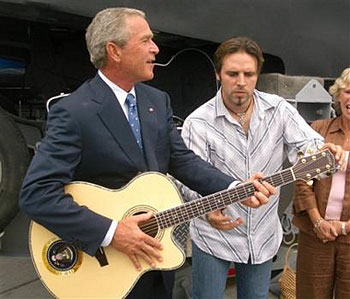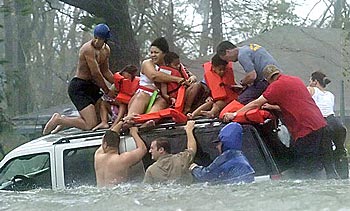MysteryGirl said:
Willow:
You thread killer!

Sorry about that. Just the messenger.

But the Houston Chronicle article highlights those questions already being asked.
The poor couldnt get out as quickly as the rich.
Here's another...
New Orleans in chaos, rescue plan under fire
By Mark Babineck
NEW ORLEANS (Reuters) - New Orleans fell deeper into chaos on Friday with gangs roaming the streets and corpses rotting in the sun a full four days after Hurricane Katrina lashed the city and exposed federal aid efforts as a failure.
A long military convoy of emergency supplies finally rolled into the flooded city on Friday morning, the first sign of significant relief after days of delays and broken promises.
Armed troops rode on the convoy and began giving out instructions to residents desperate for food, clean water and basic medical care.
Hospitals lacking drugs and power were in a desperate fight to save critically ill patients and thousands of people who lost relatives and all they own in raging floodwaters sat on sidewalks waiting for long-delayed help.
Hit by mounting criticism that his administration was too slow to respond, U.S.
President George W. Bush conceded the rescue efforts were "not acceptable" and promised to fix them. "We'll deploy the assets necessary to get the situation under control," Bush said as he left Washington to tour the region.
He told reporters in Biloxi, Mississippi that a top priority was getting troops into New Orleans to secure the city and ensure delivery of relief supplies.
The military convoys raised hopes that the government might finally be getting a grip on the crisis.
In another positive sign, commercial aircraft flew in and out of New Orleans International Airport at an improved rate of four an hour to drop off supplies and evacuate displaced residents, many of them seriously ill.
Also, the U.S. House of Representatives gave final passage to a $10.5 billion (5.6 billion pounds) emergency-aid bill that Bush was expected to sign later in the day.
But thousands of people are feared dead and New Orleans Mayor Ray Nagin said he was furious at the lack of help his historic city had received.
"I need reinforcements. I need troops, man. I need 500 buses, man," he said in a radio interview. "Now get off your asses and fix this. Let's do something and let's fix the biggest goddamn crisis in the history of this country."
Plumes of thick black smoke rose after a mighty explosion rocked an industrial area hit hard by Katrina, and an apartment complex in the centre was also in flames.
DESPERATE TO ESCAPE
Stunned residents stumbled around bodies that lay rotting and untouched. Others trudged along flooded and debris-strewn streets towards the Superdome football stadium where they hoped to be bused to safety.
Some angrily accused authorities of dividing evacuees into lines of men on one side and women and children on the other, effectively splitting up families.
"If you've got to drag me, then you'll have to drag me. I've done lost everything else, I'm not gonna lose my kids," said Albert Sumlin, who refused to get on a bus until he was reunited with wife and children.
Most of the victims were poor and black, largely because they have no cars and so were unable to flee the city before Katrina pounded the U.S. Gulf Coast on Monday. The disaster has highlighted the racial and class divides in a city and a country where the gap between rich and poor is vast.
The U.S. response would be a moral test, said U.S. Rep. Elijah Cummings, a Maryland Democrat and former head of the Congressional Black Caucus.
"Many of those now in such dire circumstances were already living in poverty and destitution even before the hurricane came. They had no ability to evacuate and now their very survival depends upon the response of this country," he said.
The scenes of destruction and mayhem resembled a major Third World refugee crisis, angering politicians and local residents who said the lack of aid was unacceptable in the world's richest country.
"Operational effectiveness is an 'F' or a grade lower, if there is such a grade," said U.S. Sen. David Vitter, a Republican from Louisiana.
Michael Brown, director of the Federal Emergency Management Agency, said 14,000 Guard troops were on the ground along the Gulf coast and he expected 30,000 there in the coming days.
Louisiana Gov. Kathleen Blanco said they were going with shoot-to-kill orders. "These troops are battle-tested. They have M-16s and are locked and loaded."
But Nagin questioned why they had not come sooner. "People are dying, people have lost their homes, people have lost their jobs. The city of New Orleans will never be the same."
Shell-shocked storm survivors said they were stunned by what had happened in their city known as a carefree place of jazz and French Quarter bars.
"Call it biblical. Call it apocalyptic. Whatever you want to call it, take your pick," said 46-year-old Robert Lewis, who was rescued as floodwaters invaded his home.
"There were bodies floating past my front door. I've never seen anything like that," he said, near tears.
The tragedy caused by Katrina did not end in New Orleans.
Storm survivors were shipped to the Houston Astrodome where the government had hoped to house 25,000 evacuees, but then limited the population to 13,000 as conditions began to deteriorate.
Officials diverted buses full of evacuees to other shelters, including the Reliant Arena next door.
Katrina forced hundreds of thousands of people from their homes and shut refineries along the Gulf Coast shut, sending gasoline prices at the pump soaring to new records of well over $3 a gallon in most parts of the country.
(Additional reporting by Erwin Seba in Baton Rouge, Louisiana, Paul Simao in Mobile, Alabama, Peter Cooney in Houston, Marc Serota in Pensacola, Florida, Steve Holland, Charles Aldinger and John Whitesides in Washington)
© Reuters 2005. All Rights Reserved.
http://today.reuters.co.uk/news/newsArticle.aspx?type=topNews&storyID=2005-09-02T183134Z_01_SCH262765_RTRUKOC_0_UK-WEATHER-KATRINA-WRAP.xml
Fri Sep 2, 2005 7:31 PM BST








